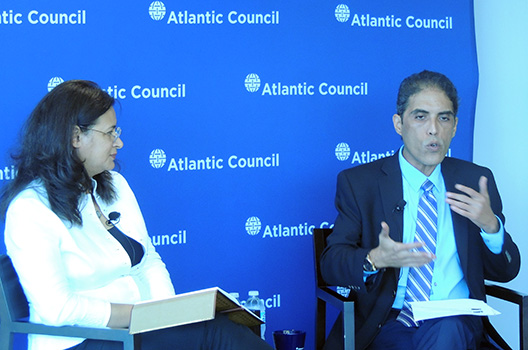 While many hoped that the public space in Egypt for non-state sectors, such as political parties, the media, and nongovernmental organizations (NGOs), would widen following Egypt’s 2011 revolution, such an expansion has yet to materialize. Rather, over three years and two presidents later, Egypt’s political climate remains stifled. On July 22, 2014, The Atlantic Council’s Rafik Hariri Center for the Middle East hosted Al-Dostour Party’s official spokesman Khaled Dawoud for a discussion on the current political and media environment in Egypt. Hariri Center Deputy Director Mirette F. Mabrouk moderated the discussion.
While many hoped that the public space in Egypt for non-state sectors, such as political parties, the media, and nongovernmental organizations (NGOs), would widen following Egypt’s 2011 revolution, such an expansion has yet to materialize. Rather, over three years and two presidents later, Egypt’s political climate remains stifled. On July 22, 2014, The Atlantic Council’s Rafik Hariri Center for the Middle East hosted Al-Dostour Party’s official spokesman Khaled Dawoud for a discussion on the current political and media environment in Egypt. Hariri Center Deputy Director Mirette F. Mabrouk moderated the discussion.
Dawoud began the discussion by explaining that after Egypt’s 2011 revolution, many believed that media freedom and the media’s space to operate would increase. Initially, there was increased freedom. While government controlled newspapers experienced slightly improved freedom of operation, there was an increase in the number of private television channels covering political issues that previously would not have been covered. However, Dawoud explained that much of the media diversity achieved after the 2011 revolution was lost after June 30, 2013. The polarized, yet diverse media environment was replaced with a narrowing of freedom of expression. Dawoud also discussed the climate in Egypt regarding political parties and NGOs. After the 2011 revolution, several new political parties emerged, including the Dostour party. However, Egypt’s new elections law is a severe setback for these parties, as it allocates eighty percent of parliamentary seats to individual candidates as opposed to party lists. Moreover, propaganda against political parties remains rife and reminiscent of the Mubarak era. In discussing NGOs, Dawoud explained that the Ministry of Social Solidarity’s recent NGO draft law is particularly damaging. He expects the law to pass, and argued that the current atmosphere in Egypt reflects a situation in which the government believes it can stifle NGOs regardless of international pressure or criticism. While past drafts of the NGO law have included input from political parties and civil society representatives, the current law reflects a return to exclusionary policies.
Finally, while Dawoud stressed the positive signals he observed regarding support for political parties and media freedom after the 2011 revolution, he also emphasized that Egypt’s political culture must change in order for progress to occur.
